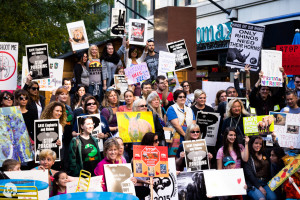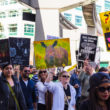Last weekend people from around the globe gathered to participate in the Global March for Elephants and Rhinos, whose purpose is to raise awareness about the dramatic decline of some of the world’s most iconic megafauna at the hands of men. Seattle marked its second year of marching, with celebrants gathering at Westlake Park in the heart of the city’s downtown shopping district. A smaller crowd than the previous year, those who turned out were still as loud and boistrous in calling for action by both citizens and governments to stem the tide of a global slaughter that could very well see these animals go extinct within our lifetime.“Tanzania has lost sixty percent of its elephants in the past six years, mainly because of poaching for ivory.”
-WildAid
Speakers included Professor Sam Wasser, author and elephant welfare expert Dr. Lisa Kane, and Allen Rubio Sandico of Tusk Task Force. Of the three, Sandico seemed the least prepared and it was hard to gather the goal of his speech. Wasser, who spoke at last year’s march, opened by blaming those in attendance for not having a larger turnout; not realizing or otherwise not caring that insulting the people who did show up is generally not a good way to start things off and warm a crowd up. As with Rubico, his speech seemed to be less focused on ways to take action and more a long litany of wrongs done to animals worldwide. That is fine, but in this observer’s opinion what’s needed more than a laundry list of crimes shouted to a crowd already all-too-aware of such injustices, is the means and motivation to make a positive difference.
Thankfully, that positive difference came in the form of Dr. Kane, who spoke in eloquent, measured tones about the crises we’re facing and encouraged marchers to take substantive action, and in those gathering support for Initiative 1401, a ballot initiative this November in Washington State that would make it a crime to sell or trade the body parts of animals threatened with extinction. Those species listed in the initiative include elephants, rhinos, tigers, lions, leopards, cheetahs, pangolins, marine turtles, sharks, and rays.
If you want to take a proactive step in helping curb legal and illegal wildlife trade, please donate to Initiative 1401, and be sure to vote Yes on it come November 3rd.
Following the conclusion of the speeches, those gathered raised signs and proceeded to march around the downtown core, chanting loudly and drawing the attention of cars and passersby alike.
In recent months there has been chatter across various online groups and organizations about the efficacy of marches like these, with some complaining that the event, as well as the overarching organizations behind them, have been co-opted by zoos and other organizations with less-than-altruistic or less-than-admirable track records of truly supporting animal issues. In short: they’ve become marketing opportunities for the less reputable, and ego stroking gatherings for those who think they’re making a difference by making a sign, showing up, marching, and thinking that’s all the good that needs to be done.
What’s lost in all this poo-pooing (which itself is a form of self-congratulatory ego stroking), is that any opportunity is an opportunity to have your voice heard by those who might not otherwise be aware of the issues and their importance. Regardless who’s jumped on the bandwagon to capitalize on events like these, at day’s end it’s still an opportunity to be vocal and reach out to those who might not already be aware of what’s happening to some of the world’s most iconic wildlife; hopefully inspiring them to make a difference and encourage others to do the same. Because that is where real, positive, actionable difference gets proper traction.
When the data overwhelmingly suggests that we might lose rhinos, elephants, and other megafauna in our lifetime, it’s not something we can ignore. All one has to do is look at the math — number of poachings each year versus remaining numbers and a given species’ ability to successfully reproduce and repopulate — to understand that we have to do everything we can, and use every opportunity we have, to stop this.
If you want to make a difference, put your ego down and embrace, take, and co-opt back everything you can and start thinking about the animals instead of your misplaced sense of self-righteousness. The difference in any event is not going to be with the well-meaning people who come to participate; it’s going to be the impact you have on random people passing by, and the curiosity it hopefully inspires in those who might not have an understanding of what’s going on to dig deeper, discover, and ultimately make changes on an individual level that have a positive impact globally. That’s the only way we’re going to make a sustainable, actionable difference.
 kimpluscraig.com
kimpluscraig.com



